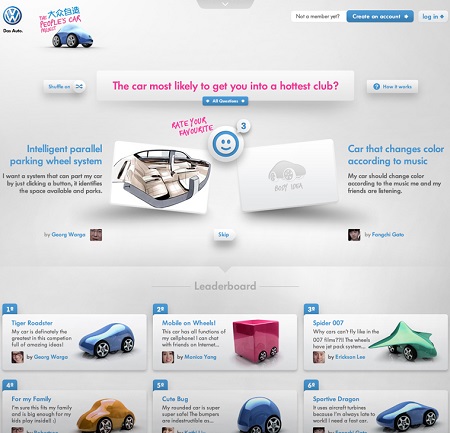In German, Volkswagen literally translates as "People's Car". To boost its brand in one if the largest and most competitive markets, the car maker started a novel social media campaign in China that let people create and vote for their favourite car designs. This case study looks at how Volkswagen managed to generate 33 million website visits and over 200,000 car designs, extending a year-long campaign into a long running project.
Started back in 2011,’The People’s Car Project’ was a long-term co-creation platform that re-invents how cars are inspired, designed, and built.
Working with agencies Proximity Beijing and Goodstein & Partners Beijing, Volkswagen provided fans with tools to create and share car ideas, and a voting system letting users choose the best designs.
The project was a runaway success, not just winning new fans and standing out from other brands, but even helping shape future product design strategy.
Number one car brand on social media
As a result, Volkswagen designers, together with over 3.1 million fans, help upgrade current cars and shape future ones. Volkswagen rose to the number 1 car brand on Chinese social media in 10 weeks.
As an epic conclusion to the project, and ultimately, to honour the people’s creativity, Volkswagen decided to take all their ideas and create one car.
Volkswagen created a 10-part online series where they invited the top automotive design students in China to compete and build the People’s Car.

This was a collaboration between two design universities, Volkswagen’s Director of Design, leaders from various creative fields (a pop idol, a filmmaker, and a fashion designer).
Volkswagen unveiled the concept car – an MPV that seats 7 people – at the 2013 Shanghai Auto Show. A commercial showcased how the people’s ideas integrated into the innovative features of the People’s Car. The 10-part online series averaged 1.2 million viewers per episode.
"The ‘People's Car Project' in China marks the beginning of a new era in automobile design", Luca de Meo, Director of Marketing, Volkswagen Group said. "We are no longer just building cars for, but also with customers and at the same time initiating a national dialog which gives us a deep insight into the design preferences, needs and requirements of Chinese customers."
View the hover car 'thank you' video below:
The other two ideas don't quite inspire the "futuristic nostalgia" of the Hover Car. The Music Car uses a series of exterior OLED lights to create light shows in tune to the driver's music.
The Smart Key is a twist on current generation smartphone integration. Instead of a phone, the concept uses a touchscreen-equipped vehicle key to provide information about the car, such as fuel level and security.
Influence on product strategy
"The creative ideas from the ‘People's Car Project' give us a valuable insight into the wishes of Chinese drivers," Simon Loasby, Head of Design at Volkswagen Group China, said. "The trend is towards safe cars that can easily navigate overcrowded roads and have a personal, emotional and exciting design."
Following the strong response, Volkswagen extended the People's Car Project. Originally scheduled for a one-year run, Volkswagen went on to sponsor the program indefinitely, with plans to move the project beyond China.
"In a long-term context, the findings of the ‘People‘s Car Project’ will influence Volkswagen’s product strategy," de Meo said. "The design of our models will, however, continue to reflect the tradition of the Volkswagen brand. If at some time in the future we are to produce a vehicle from the ‘People's Car Project', it will be a combination of customers' opinions and brand tradition."